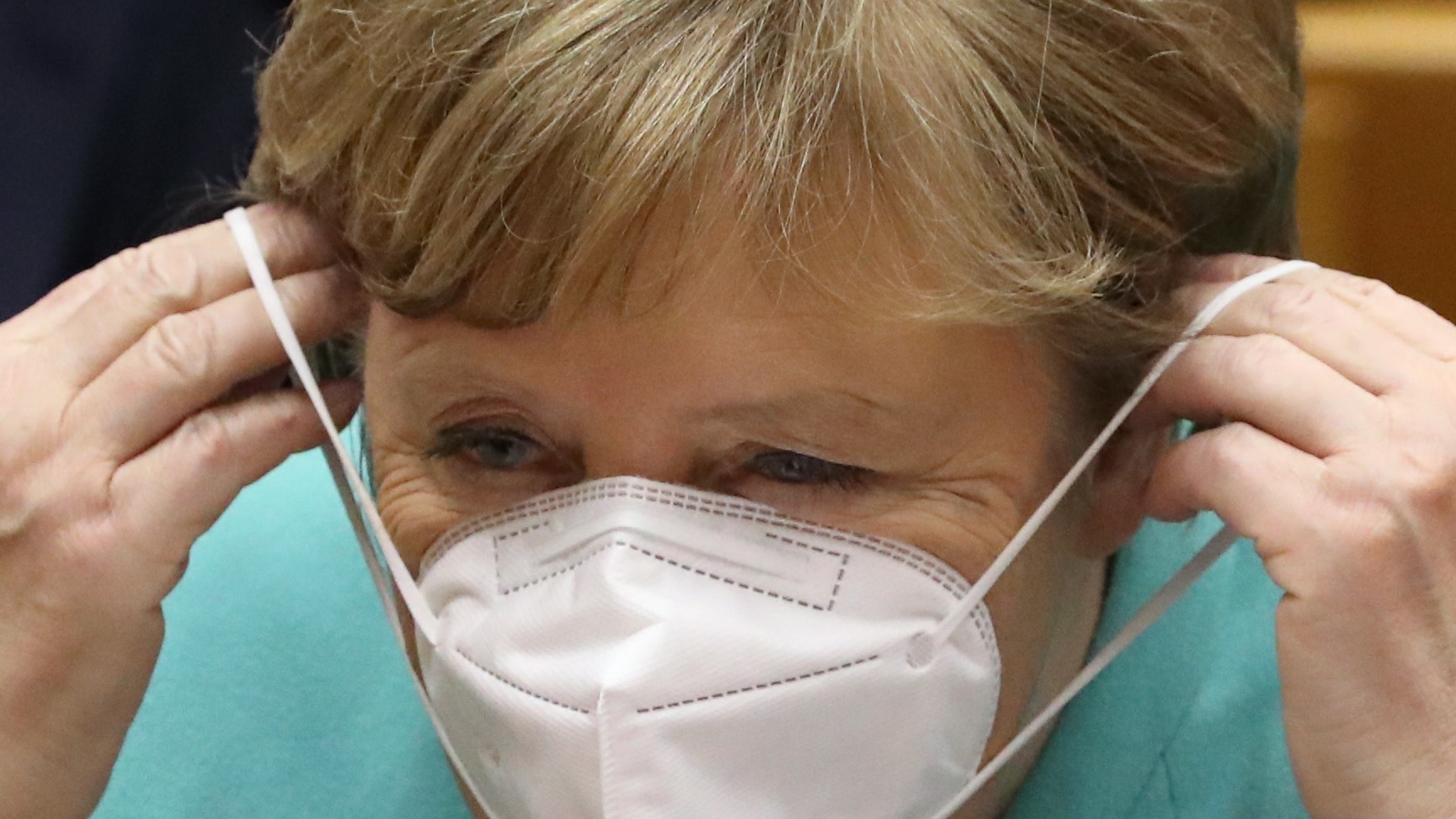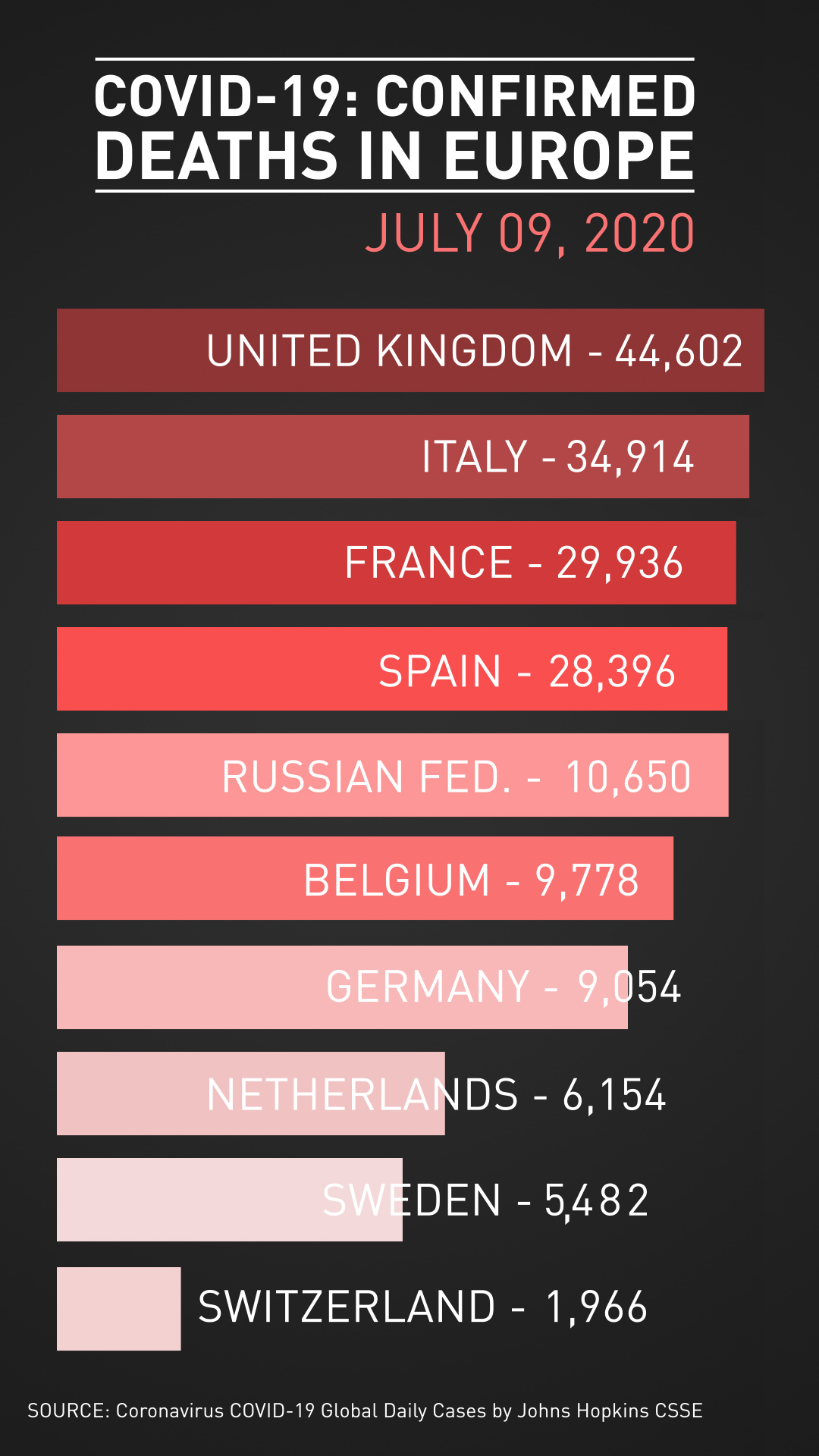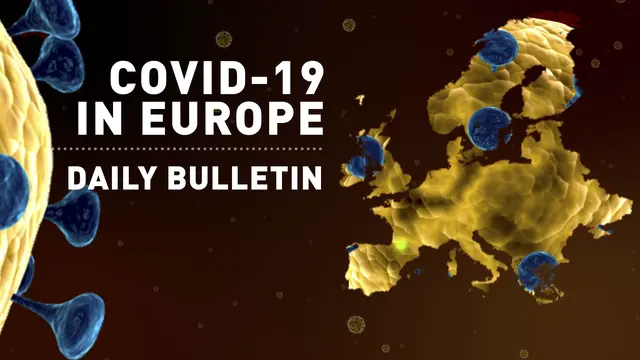TOP HEADLINES
-
The region of Catalonia, in northeastern Spain, has made face masks compulsory in public for anyone over the age of six, even where social distancing is possible, after a recent spike in COVID-19 cases around the city of Lleida.
-
Jean-Francois Delfraissy, the head of France's Scientific Council, has told
Le Monde
newspaper the country risked a second wave as people fail to abide by social-distancing rules . "The virus continues to circulate, albeit much slower, much more controlled, but it is still there," he said.
-
More than one million people – one-fifth of the population – have downloaded Ireland's COVID-19 tracker app since its launch on Tuesday. Paul Reid, the head of the Health Service Executive, hailed it "the most successful launch of this app anywhere in the world."
-
**Slovakia has reported its biggest daily jump in coronavirus cases (53) since 22 April, **according to Health Ministry data, its seventh double-digit daily rise since 30 June. The Central European country, which has a death toll of 28, has largely avoided a surge like those of its Western neighbors.
-
In Russia, a further 176 people have died in the past 24 hours, bringing total fatalities to 10,843. It now has 707,301 reported cases – the fourth highest in the world – up 6,509 since Wednesday.
-
** Public spending in the UK to tackle the crisis has risen to nearly $240 billion** . Rishi Sunak, the finance minister, said on Thursday morning the government "is throwing everything we can" at supporting Britain's economy, but added "we can't sustainably live like this" in the medium- to long-term.
-
German Chancellor Angela Merkel has called on lawmakers in Brussels to agree on the European Union's proposed economic stimulus package as the bloc recovers from the COVID-19 crisis. "Europe will emerge from the crisis stronger than ever if we strengthen cohesion and solidarity," said Merkel, as Germany assumed the EU presidency until the end of the year.
-
A further 12 people have died in Germany in the past 24 hours, according to the Robert Koch Institute. The country's death toll now stands at 9,048.
-
The intensive care unit at Papa Giovanni XXIII hospital in Bergamo, one of the worst-hit areas in Italy, officially has no positive COVID-19 cases for the first time in 137 days. On 23 February, it was the first hospital in Italy to admit coronavirus patients.

German Chancellor Angela Merkel has called on the European Union to come together to fight COVID-19. /Yves Herman/AFP
By far the most successful launch of this app anywhere in the world. Well done Ireland
- Paul Reid, head of Ireland's Health Service Executive
ACROSS EUROPE
Nawied Jabarkhyl in London
We now have an official cost for the unprecedented support measures introduced to try to keep the British economy afloat as a result of the damage caused by COVID-19. The UK's Treasury says public spending on the virus has risen to $240 billion, as the finance minister, Rishi Sunak, warned of a "severe recession," indicating the worst may be yet to come.
The figure is almost $3,800 per person in the UK, signaling the huge debt levels taken on by the government. But, despite the $38 billion of measures announced by Sunak on Wednesday, concern is growing about long-term funding for the plans. And many sectors including aviation and the automotive industry say the help isn't enough.
And it's not just politicians who are worried about the coming months. England's deputy chief medical officer has warned people to take the risk of a second wave of cases far more seriously, as Britain eases its lockdown. Jenny Harries suggested some people should lose weight or take other measures to prevent future complications from COVID-19.
Lucy Hough in Brussels
Belgium's leading virologist Marc Van Ranst is warning that a new peak of COVID-19 cases could only be a month away, as the downward trend of the number of new cases slows.
A contact-tracing app for Belgium will be ready in September, which will work across the entire country. The app was approved in mid-June, with Belgian authorities initially deciding not to develop the technology.
The app will notify everyone who has been in contact with a new coronavirus case; those people will then be advised to notify their doctor.
00:10

Ross Cullen in Paris
Six clusters of the coronavirus have been identified in Mayenne, a region in the west of France. The Pays de la Loire Regional Health Agency says it is putting place "an action plan."
The director-general of the health agency said: "When it comes to the coronavirus, the match is not over. Don't let your guard down."
One of the clusters is in a care home, where more than 100 positive cases have been registered, were all asymptomatic – this particular elderly residence experienced a COVID-19 outbreak in June. Several villages have been affected and two slaughterhouses in the region also have clusters. One thousand tests are taking place this week on residents in the region, with all people being urged to sign up for screening.
Mia Alberti in Frankfurt
Germany's success in stabilizing the COVID-19 pandemic is translating into positive signs for its economy.
As the country started gradually lifting lockdowns and restrictions, German exports increased by nine percent in May, after a significant 24 percent drop in April, the Federal Statistics Office said on Thursday.
Imports also showed signs of improvement with a 3.5 percent rise in May, after a drop of 16.6 percent the month before.
On Thursday, there were 442 new coronavirus cases in Germany, in line with the variations of the last few days. The total number of cases is now 197,783. Twelve people died in the past 24 hours, raising the total number of fatalities to 9,048, according to the Robert Koch Institute.
Isobel Ewing in Budapest
Clusters of the coronavirus across Hungary suggest the virus is still present in the community, with cases emerging in three different parts of the country over the past week.
Cases have emerged at a wedding in Tolna, a town south of Budapest, in a school in Mezokovesd, a town east of Budapest, and at a student camp in Satoraljaujhely on the border with Slovakia.
The school has suffered the biggest cluster, with 21 people testing positive and contact tracing ongoing.
Cases in Hungary have been stable over the past few months, with the number of active cases just over 700, but the arrival of summer has brought with it a relaxation of restrictions among the public.
Masks remain compulsory in shops where people are generally compliant, but fewer people can be seen wearing masks on trains, trams and buses, despite them still being mandatory.
Andy Murray on Serbia
Serbia President Aleksandar Vucic made a last-minute U-turn on Wednesday on plans to reintroduce a weekend lockdown in an effort to prevent another evening of violent protests in Belgrade. The government will announce a new set of restrictive measures on Thursday, he said.
Disturbances in the capital continued yesterday evening, however.
Police fired tear gas at anti-government protesters after being pelted with flares and stones as thousands protested in front of the Belgrade parliament building, despite warnings that such gatherings could spread coronavirus infections.
Violence first erupted on Tuesday when a crowd stormed parliament in protest at plans to reimpose a lockdown following a new spike in COVID-19 cases. Forty three police officers and 17 protesters were injured. There were 23 arrests.
Serbia, a country of 7 million people, has reported 17,076 coronavirus cases and 341 deaths. Health authorities say hospitals are running at full capacity and staff are exhausted. The number of new infections rose to 357 on Wednesday from 299 on Tuesday.
00:44

FROM OUR GLOBAL COLLEAGUES
CGTN China:
China is fighting COVID-19 with a QR code, but is everyone on board?
CGTN America:
Brazil's former President discusses Bolsonaro, country’s response to COVID-19
CGTN Africa:
Kenya will not quarantine tourists with no COVID-19 symptoms
Sign up
here
to get the COVID-19 Europe bulletin sent directly to your inbox
CGTN Europe has been providing in-depth coverage of the novel coronavirus story as it has unfolded.
Here
you can read the essential information about the crisis.
Source(s): Reuters
 简体中文
简体中文

